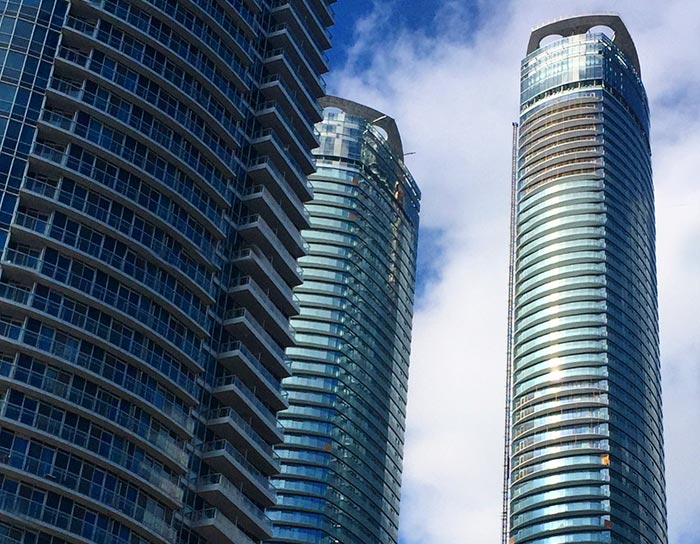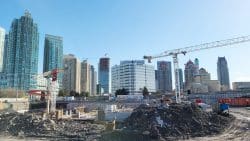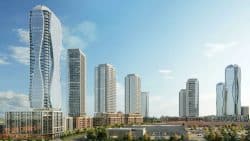Psychology Of Condos
Why are condominiums such a popular living option these days? Decades ago they weren’t even considered the norm unless in the heart of a downtown metropolis and very few buildings put effort into revolutionary design and architecture. How come now, in our current time period are they becoming the go-to form of living? The future generation for the most part has their real estate sights set on condominium living. Even the construction rate is proof of the popularity of condos, Toronto alone had a record of new units built last year and Mississauga is currently well into its largest single condominium community development, Parkside Village. Psychology of Condos, just like Psychology of Suburbs will explore the various factors that impact our condo lifestyle preference.

Let’s begin looking at the psychology of condos by exploring the concrete factors that are driving this lifestyle movement prior to observing some of the more abstract aspects. Realistically, I can only speak for the Square One condos market, Toronto condos and the Greater Toronto Area in general given my direct exposure to the market here, although I’m quite certain that parallels can be drawn with other locales globally. To begin analysing the psychology of condos, lets look at demand. The lifestyle choice of condominium occupation is in part fuelled by requirement rather than choice. As the value of detached, freehold homes has soared in the Greater Toronto Area (GTA) markets, many people simply cannot afford to purchase these forms of dwelling. Condos provide a much lower entry point when it comes to pricing. The main principle surrounding this idea of increased overall prices driving the condo market and forcing people into occupancy cannot be sustained. What if the prices were to drop by half for freehold homes, would people suddenly flock back into that form of housing? Definitely a portion would, but many wouldn’t. This is because the psychology of condos goes far beyond this traditional reasoning where the explanation has been that “condos are popular because traditional housing is too expensive to afford”. This is quite the false statement. The root of the psychology of condos and trend towards this lifestyle is impacted by many more transitional factors.
One of the biggest proponents of the condominium lifestyle preference is time. Time plays a very dynamic role influencing the psychology of condos in very different ways. Typically condominiums are built around “hubs”. A hub is basically a focal point of various human principles; work, transportation, food, entertainment and other socio-economic and life items. Transportation is a big facet in terms of time dynamics because condos are usually built around transport lines or ease of access locations. Especially in the GTA, developers have focused heavily on providing condominiums close to subway lines or other modes of public transportation. Why is this? Well, for one thing, public transportation, especially in cities and with rising costs of living eliminates the need for a vehicle in most cases. Most people will then argue that you lose time on public transportation as it takes a longer period to move from point A to B. But really, are you losing time? When you drive, that is all you can do as all focus needs to be presented to the task of driving your vehicle. This was made quite clear when I was speaking to an individual who said he used to read much, much more while taking the bus as opposed to after he purchased a car. The time spent on public transportation can be utilized for work tasks, self enhancement through reading or other form of mental stimulation. This is positive use of time whereas driving your car is typically limited to stress, music, or the occasional audio book that most people really don’t take advantage of. So how does this relate to condos? Our current transitional generation that is now entering the work environment has grown up in a state where time is far more scarce than it used to be. Work now follows you 24/7 in most instances given the complete connection you have via technology. Optimizing your daily allotment of existence is key to a fulfilling existence, or else you tread into the realization of the “not enough hours in the day” mentality. Especially within cities, where public transportation periods are minimal, the existence of condos in close proximity to these arterial passages allows residents to optimize their use of time far more than they can living in traditional housing away from condo “hubs”.
This idea of public transportation and time blend further within the psychology of condos. The physical form of a condominium in itself helps with this population optimization. An entire household neighbourhood of 300 people cannot physically all be in close proximity to a transportation station. Some homes will be further away to the point where people need to drive just to get to the Go Train Station to continue their commute. A condominium tower can exist vertically, therefore providing all residents equal distance to transportation save the added seconds in elevator time for the higher floors. This idea is focused on a small scale but follows the same concept of purchasing lower priced properties outside the city, the time and overall cost is not justified. What this means is that in our continuous journey of optimization, the condominium housing style simply makes sense in terms of physical space allocation. Within the GTA itself there are approximately 100,000 new residents every year. That is a substantial human population that needs shelter. Plotting our housing on a planar level is not the logical method for such high growth, rather, with the construction technology available, it only makes sense to go up. The creation of the Green Belt was an amazing decision by our government to boost this form of thinking in terms of how to make the best use of land. And believe me, the best use of land does not consist of building sprawling, monotonous suburbs. See, the current generation and obviously the future demographics are used to living a life of ease and optimization. Everything that we interact with is moving in a forward trend at frightening and enlightening speeds, including now, the way our housing is structured.
Jumping quickly back to the topic of time utilization during transportation, is this not the main reason why the push for automated cars is so strong. This implementation of autonomous technology would allow us to use our time for much better purposes, both productively and socially whilst in an automotive vehicle. Touching upon “socially” in the previous sentence, lets take a look at the psychology of condos in terms of the social benefits. As I had stated in the suburb related article, typical housing neighbourhoods are devoid of social stimulation for many categories of people, especially adolescents. You don’t have close proximity of entertainment or activity space within traditional

areas. Unless the kids drive a car, chances are they need to find forms of activities either within the home or in the immediate neighbourhood, and we all know how much there is to do in a suburb – sarcasm. A condominium allows for an interesting blend of interaction. Even if the building is not located in a downtown area like Toronto, but rather in a pocket like Erin Mills, there are still amenities within the condominium itself. For younger children, they can make friends in the condo, eliminating the security issues of venturing into the public streets with no supervision (I’m talking about younger children here). For the older demographics, such as young professionals and individuals in their 20’s-30’s, they can meet various people in passing, throughout the amenities and some of the social functions held by the condo itself. This can even apply to the older generations too with some great condos having group exercise events and other plans to bring people together. Within traditional housing, social interactions are very compartmentalized and limited to people you already know, unless you are lucky and live in a very socially outgoing locale. A condo forces interaction given the physical form of housing that it provides. This is a very abstract way of thinking about condominium psychology, but it tends to make sense once you pay attention to all of these small nuances in your own everyday life.
Looking back at the idea of optimization, everything seems to focus on this task. Quantum computers are being developed to help optimize the process of finding answers to push us into the future when it comes to technological breakthroughs and applications. We craft more efficient communication systems to help reduce the time it takes to speak with people along great distances. Faster train speeds and futuristic concepts are being put into concrete plans of action all in terms of reducing wasted time. How come our housing style is still predominantly laid out in the same form it was during the feudal ages when it was basically implemented. I don’t mean this in the sense of land ownership, but rather the wasted space that comes with typical freehold housing styles. This may be a futurist way of thinking and I have nothing against our current freehold homes, having ample space is great, but in the bigger scheme of things and looking at it a 100 years from now, condominium style living in terms of high-rises composed of individual dwellings is the logical way to go. Realistically, as humans we don’t need all the space we get with the freehold homes. People at this point will say something about the need for a backyard or outdoor living space. But really, with the latest subdivisions, do you even have a proper backyard? Most of the time it is immediately surrounded by neighbours offering no privacy. You’d be better off with a slightly smaller balcony that provides proper privacy and outdoor living space. This also goes hand in hand with the amount of information we can process on a daily basis. With more and more tasks inherited in our lives thanks to the forward motion of our species as a whole, we don’t have the cognitive willpower or time to worry about trivial items like washing windows or repairing driveways and shovelling snow. I’m not talking about everyone here, but a large part of the future generation, the one that is replacing the baby boomers in the work force. These are people who like to optimize their lives, to eliminate every problem that they don’t have to deal with themselves, just like an efficient company eliminates deficiencies and delegates processes to specific people through paying them. Within a condominium you pay your maintenance fee for the idea of not worrying about living, but rather just living. This statement is really what the psychology of condos leads into…
Look at the macro view of our transition of living on farms and dispersed over great distances into central focal points now known as cities. This is what is happening on a smaller scale with condominiums. Each condo building is essentially representative of a town. You have the collection of residents, the amenities, the security and the governing body that sets out a budget and operates the building like a town. It is the pinnacle of streamlined living. Having optimized our whole system of housing layouts over hundreds of years and slowly summarizing it to the point where we have combined the entire functions of a town within a single residential tower. This is why the psychology of condos is the defined future of the way we will be living. Just like Thomas Watson wrongly predicted that there will never be a need for personal computers in every household, there is a sense of unease with this transition due to the known psychological preference for not changing out of human comfort zones. However, the younger generation, the future of our world has grown accustomed to this optimized form of living, something that seems wrong and inhumane to the previous generation. The people who look at condos as “shoeboxes in the sky” have to look at it from the perspective of overall human advancement. It is an inevitable trend that is as big a part of our ingrained psychology as it is to explore and move forward. From developing hammers and shovels to ease the completion of tasks, to leading an industrial revolution, to beginning to explore the far reaches of space, our species seeks continuous evolution. In the end, the psychology of condos and our growing trend towards this type of lifestyle all comes down to one word: optimization.




